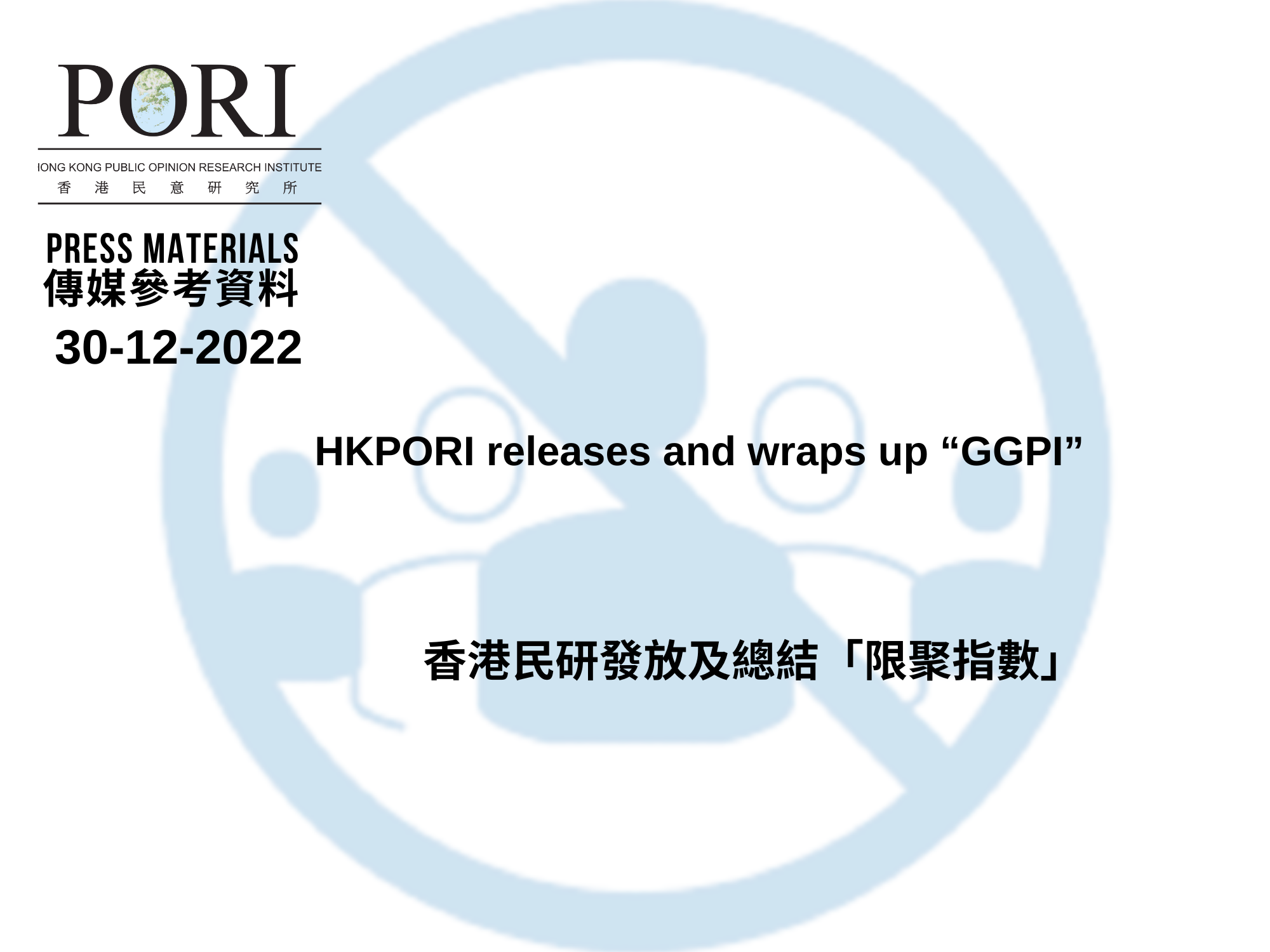December 28, 2021
Hong Kong Public Opinion Research Institute Press Conference – Press Materials
Speakers:
Kim-Wah Chung – Deputy CEO, HKPORI
Francis Lee – Director, School of Journalism and Communication, The Chinese University of Hong Kong
Wai-Ho Yam – Member, Alliance of Revitalizing Economy and Livelihood
Edward Tai – Manager (Data Science), HKPORI
Detailed Findings
POP releases results of the 2021 review and 2022 forecast survey
Special Announcement
The predecessor of Hong Kong Public Opinion Program (HKPOP) was The Public Opinion Programme at The University of Hong Kong (HKUPOP). “POP” in this release can refer to HKPOP or its predecessor HKUPOP.
Abstract
POP successfully interviewed 1,017 Hong Kong residents by a random telephone survey conducted by real interviewers in mid-December. Our survey shows that net satisfaction with Hong Kong’s development in the year past stands at negative 26 percentage points. The situation continued to improve significantly compared to last two years. Looking ahead, net optimism toward Hong Kong’s development next year in general stands at positive 12 percentage points, which has also increased significantly from last year and registered a record high since 2016. At an individual level, net happiness value in the year past stands at negative 10 percentage points. The situation has also improved significantly compared to last two years. As for personal development in the coming year, net optimism stands at positive 26 percentage points, which has also increased significantly from last year and registered a new record high since 2016. As for people’s New Year wishes, society-related ones continued to drop from its record high in 2019 to 40%, while 22% were wishes related to personal matters. Only 6% were world peace-related, registering a record low since 1998. Meanwhile, as many as 18% said they did not have New Year wishes, registering a new high since the survey series began in 1992. The effective response rate of the survey is 58.0%. The maximum sampling error of percentages is +/-4%, that of net values is +/-7% and that of ratings is +/-0.1 at 95% confidence level.
Contact Information
|
Date of survey |
: |
9-14/12/2021 |
|
Survey method |
: |
Random telephone survey conducted by real interviewers |
|
Target population |
: |
Cantonese-speaking Hong Kong residents aged 18 or above |
|
Sample size[1] |
: |
1,017 (including 505 landline and 512 mobile samples) |
|
Effective response rate |
: |
58.0% |
|
Sampling error[2] |
: |
Sampling error of percentages not more than +/-4%, that of net values not more than +/-7% and that of ratings not more than +/-0.1 at 95% conf. level |
|
Weighting method |
: |
Rim-weighted according to figures provided by the Census and Statistics Department. The gender-age distribution of the Hong Kong population came from “Mid-year population for 2020”, while the educational attainment (highest level attended) distribution and economic activity status distribution came from “Women and Men in Hong Kong – Key Statistics (2020 Edition)”. |
[1] This figure is the total sample size of the survey. Some questions may only involve a subsample, the size of which can be found in the tables below.
[2] All error figures in this release are calculated at 95% confidence level. “95% confidence level” means that if we were to repeat a certain survey 100 times with different random samples, we would expect 95 times having the population parameter within the respective error margins calculated. Because of sampling errors, when quoting percentages, journalists should refrain from reporting decimal places, whereas one decimal place can be used when quoting rating figures.
Latest Figures
Herewith the figures of 2021 review and 2022 forecast, compared with similar figures obtained in recent years:
|
Date of survey |
17-20/12/18 |
18-23/12/19 |
18-22/12/20 |
9-14/12/21 |
Latest change |
|
Sample size |
1,000 |
1,067 |
633 |
589-651 |
— |
|
Response rate |
60.6% |
61.6% |
68.7% |
58.0% |
— |
|
Latest findings |
Finding |
Finding |
Finding |
Finding & error |
— |
|
Satisfied with HK’s development in the year past [3] |
36% |
9%[4] |
9% |
26+/-4% |
+17%[4] |
|
Dissatisfied with HK’s development in the year past [3] |
37% |
84%[4] |
72%[4] |
52+/-4% |
-20%[4] |
|
Net satisfaction rate |
-1% |
-75%[4] |
-62%[4] |
-26+/-7% |
+37%[4] |
|
Mean value[3] |
2.9 |
1.6[4] |
1.9[4] |
2.5+/-0.1 |
+0.6[4] |
|
Expected HK’s development to be better next year |
23%[4] |
23% |
34%[4] |
40+/-4% |
+7%[4] |
|
Expected HK’s development to be worse next year |
50%[4] |
59%[4] |
39%[4] |
29+/-4% |
-11%[4] |
|
Net optimism |
-27%[4] |
-36%[4] |
-6%[4] |
12+/-7% |
+17%[4] |
|
Respondents who were happy in the year past [3] |
55% |
20%[4] |
13%[4] |
29+/-4% |
+16%[4] |
|
Respondents who were unhappy in the year past [3] |
15%[4] |
58%[4] |
59% |
40+/-4% |
-19%[4] |
|
Net happiness value |
40% |
-38%[4] |
-45% |
-10+/-7% |
+35%[4] |
|
Mean value[3] |
3.5[4] |
2.3[4] |
2.2 |
2.8+/-0.1 |
+0.5[4] |
|
Expected personal development to become better next year |
39% |
31%[4] |
31% |
42+/-4% |
+11%[4] |
|
Expected personal development to become worse next year |
17% |
38%[4] |
25%[4] |
15+/-3% |
-9%[4] |
|
Net optimism |
22% |
-7%[4] |
6%[4] |
26+/-6% |
+20%[4] |
|
New Year wishes: Society-related (e.g. economic related, people’s livelihood, political related and others) |
39% |
65%[4] |
49%[4] |
40+/-4% |
-9%[4] |
|
New Year wishes: Personal matters (e.g. health, career, studies, wealth, family, love, marriage, friendship and other personal issues) |
34% |
9%[4] |
22%[4] |
22+/-3% |
— |
|
New Year wishes: World peace-related |
8%[4] |
12%[4] |
7%[4] |
6+/-2% |
-1% |
|
No special wish |
9% |
8% |
10% |
18+/-3% |
+8%[4] |
[3] Collapsed from a 5-point scale. The mean value is calculated by quantifying all individual responses into 1, 2, 3, 4, 5 marks according to their degree of positive level, where 1 is the lowest and 5 the highest, and then calculate the sample mean.
[4] The difference between the figure and the result from the previous survey has gone beyond the sampling error at 95% confidence level, meaning that the change is statistically significant prima facie. However, whether the difference is statistically significant is not the same as whether they are practically useful or meaningful, and different weighting methods could have been applied in different surveys.
Our annual year-end survey shows that 26% were satisfied with Hong Kong’s development in the year past, 52% were dissatisfied, giving a net satisfaction of negative 26 percentage points. The mean score is 2.5, meaning between “quite dissatisfied” and “half-half” in general. The situation continued to improve significantly compared to last two years. Looking ahead, 40% expected Hong Kong’s overall development next year would be better than last year, 29% said it would be worse, giving a net optimism of positive 12 percentage points, which has also increased significantly from last year and registered a record high since 2016.
At an individual level, 29% said they lived a happy life in the year past, 40% said they were not happy, giving a net happiness value of negative 10 percentage points. The mean score is 2.8, meaning close to “half-half” in general. The situation has also improved significantly compared to last two years. As for the coming year, 42% believed their personal development would become better, 15% thought they would be getting worse, giving a net optimism of positive 26 percentage points, which has also increased significantly from last year and registered a new record high since 2016.
As for people’s New Year wishes, society-related ones continued to drop from its record high in 2019 to 40%, while 22% were wishes related to personal matters. Only 6% were world peace-related, registering a record low since 1998. Meanwhile, as many as 18% said they did not have New Year wishes, registering a new high since the survey series began in 1992.
Data Analysis
Our survey shows that net satisfaction with Hong Kong’s development in the year past stands at negative 26 percentage points. The situation continued to improve significantly compared to last two years. Looking ahead, net optimism toward Hong Kong’s development next year in general stands at positive 12 percentage points, which has also increased significantly from last year and registered a record high since 2016. At an individual level, net happiness value in the year past stands at negative 10 percentage points. The situation has also improved significantly compared to last two years. As for personal development in the coming year, net optimism stands at positive 26 percentage points, which has also increased significantly from last year and registered a new record high since 2016. As for people’s New Year wishes, society-related ones continued to drop from its record high in 2019 to 40%, while 22% were wishes related to personal matters. Only 6% were world peace-related, registering a record low since 1998. Meanwhile, as many as 18% said they did not have New Year wishes, registering a new high since the survey series began in 1992.

